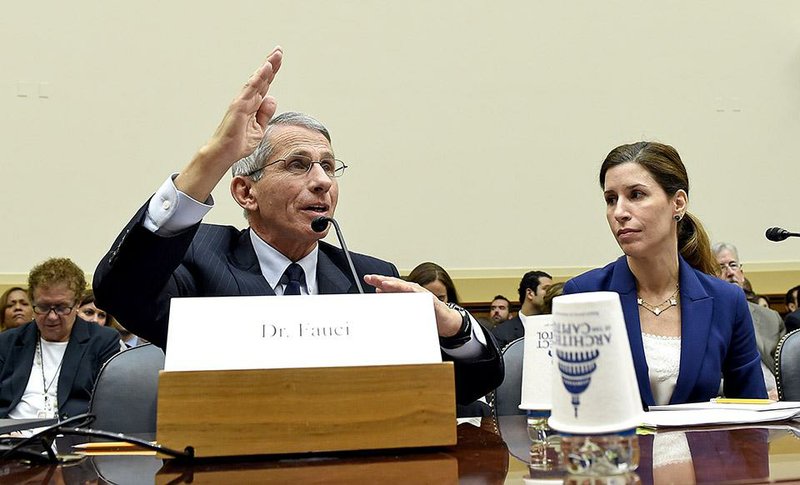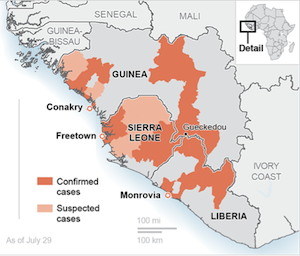MONROVIA, Liberia -- People critically ill with Ebola languish in an ambulance for hours as paramedics seek a place for them. Treatment centers fill up as soon as they are opened. The situation is so dire in Liberia that its president welcomed a U.S. pledge of troops and treatment centers, but said much more needs to be done.
President Ellen Johnson Sirleaf on Wednesday urged the world community to redouble efforts to battle the disease, which also has hit four other West African nations.
"Our American partners realize Liberia cannot defeat Ebola alone," Sirleaf said in a written statement. "We hope this decision by the United States will spur the rest of the international community into action ... The entire community of nations has a stake in ending this crisis."
Even as the promises of aid came, the risks of such help were made more apparent as another international health care worker fell ill in Liberia. Doctors Without Borders said the female French employee would be evacuated to a special treatment center in France after being placed into isolation Tuesday.
The infection marks the first time an international Doctors Without Borders worker has contracted Ebola. Six local staff members have been infected, three of whom died. It was not clear whether they had become sick at work or had contracted the virus from the communities where they lived.
More than 300 health workers have become infected with Ebola in Guinea, Liberia and Sierra Leone. Nearly half of them have died, according to the World Health Organization. At least seven international health care and aid workers already have been taken abroad for treatment, and concerns over health worker infections have made it difficult to recruit the foreign help needed to combat the epidemic.
Doctors Without Borders has long had the most stringent infection control protocol against Ebola. While many facilities are working with a fraction of the staff they need, Doctors Without Borders adheres to its rule that every caretaker treating a patient enters the ward with a buddy, who watches the caretaker to ensure his suit doesn't slip, for instance.
"This dramatically reduces the risk of transmission of the disease," said Brice de le Vingne, the group's Director of Operations. "However, the risk is part of such an intervention, and sadly our teams are not spared."
The World Health Organization estimates about 1,500 international health workers are needed to help curb Ebola.
President Barack Obama announced Tuesday that he will order 3,000 U.S. military personnel to West Africa. The U.S. is also planning on delivering 17 treatment centers with 100 beds each to Liberia. American officials expect to have the first treatment centers open in a few weeks. It is unclear when all of the personnel and equipment will be on the ground.
Ebola is believed to have killed at least 2,400 people in the largest outbreak ever and sickened nearly 5,000, though the real toll may be much higher.
Also Wednesday, Australia announced that it is providing another $6.4 million to the fight, while Germany is considering providing a mobile hospital and transport planes.
The three-hardest hit countries -- Liberia, Sierra Leone and Guinea -- are short of everything needed to contain it, from health workers to the hazard suits needed to protect them. Cases have also been reported in Nigeria and Senegal.
The International Monetary Fund said Wednesday that it was preparing $127 million in zero-interest loans to help the three countries deal with rising health and security expenses at a time when the disease has damaged their economies and reduced tax revenue. The $127 million would be on top of existing IMF loans to the countries.
The World Bank on Tuesday also approved a $105 million grant to finance efforts to contain Ebola.
Meanwhile, in a $1 billion Ebola plan released Tuesday, the WHO estimated it might have to evacuate about seven international health workers every month as the outbreak continues.
"This is just part of crisis management," said Dr. Bruce Aylward, WHO assistant-general in charge of emergencies. "In any emergency situation, you have to take care of your first responders who get infected."
Aylward acknowledged health workers have been getting infected at an alarming rate in West Africa. WHO has already evacuated two international staff members from Sierra Leone in recent weeks, including a Senegalese scientist who was not involved in treating patients and should not have been at high risk for catching the disease.
In Liberia, many of those who have come down with the disease are either not picked up or left to languish in emergency vehicles while waiting for beds to open up.
One ambulance dispatcher said he knew of at least 30 people in Monrovia, the capital, who were waiting to be taken to treatment centers. Some were waiting in a hospital not equipped to treat Ebola patients, he said.
"The other day we rushed some critically-ill patients to one of the treatment centers, but because there was no space, we had the patients waiting in the ambulance for six hours," he said, speaking on condition of anonymity because he was not authorized to share the information with the media.
Officials have warned that infected people who are turned away from treatment centers often return home, where they infect their relatives and neighbors with the disease, which is spread through contact with bodily fluids.
Meanwhile, a top U.S. scientist said Wednesday that it's incredibly unlikely that Ebola would mutate to spread through the air, but the best way to make sure it doesn't is to stop the epidemic.
"A virus that doesn't replicate, doesn't mutate," Dr. Anthony Fauci of the National Institutes of Health told a House Foreign Affairs subcommittee, after lawmakers asked if the disease might become airborne.
U.S. researchers are monitoring for mutations in the virus, but mutation concern is not "something I would put at the very top of the radar screen," said Fauci, head of NIH's National Institute of Allergy and Infectious Diseases.
Information for this article was contributed by Krista Larson, Kirsten Grieshaber, Rod McGuirk, Paul Wiseman and Lauren Neergaard of The Associated Press.
A Section on 09/18/2014


